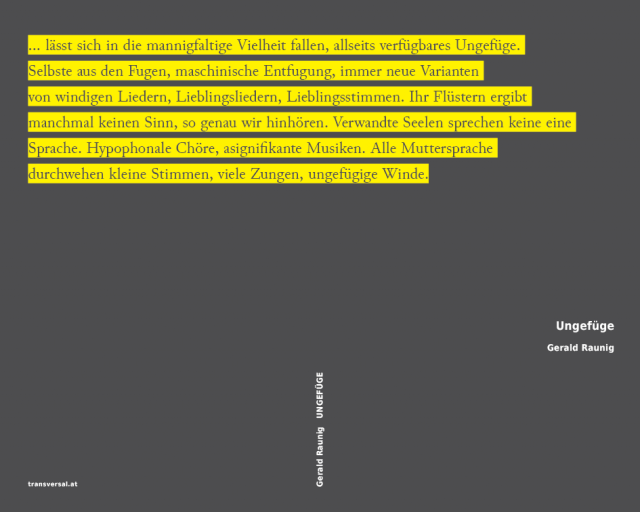
Hagay Dreaming (review)
5 November, 2022 - 00:03 by felixThis review was originally published at Digicult, 1.11.2022, also in Italian and Chinese.
Hagay Dreaming, the most ambitious and radical work presented during Ars Electronica 2022 wasn’t even part of the festival proper. Rather, it was hosted in parallel by Stadtwerkstadt, an independent cultural venue in Linz. This “techno-fantasia guided theater of revival” has been initiated and schemed by Shu Lea Cheang, and written and directed by Dondon Hounwn, an artist working in installation and performance art, and a practicing shaman from the Truku tribe, one of the 16 recognized indigenous tribes in Taiwan.
New Dawn of Everything (ultra short review)
6 December, 2021 - 12:35 by felix
So, I finished reading "The Dawn of Everything", the new book by David Graeber and David Wengrow. In many ways, it's the perfect book for our dark historical moment. It's all about historical possibilities, yet not in the future, but in the past. Thus, an escape and an inspiration. It's an amazing read, so full of detail that's impossible to summarize. You really should read it yourself.
I'll just focus on the structure here. The book aims to deconstruct the dominant linear narratives of human culture, in which the "agricultural revolution" (which wasn't a revolution in the sense of quick and radical change) and the emergence of cities (again, a multi-directional (back and forth), rather than linear development) inexorably lead to inequality, domination, and "the state". There are two conventional versions of this story: the loss of freedom/equality (Rousseau, Hariri, etc) or the gain of civilization (Hobbes, Diamond, etc). Graeber and Wengrow argue, in dizzying archeological and anthropological detail, that both are wrong and severely curtail our imagination of social potential. Their baseline assumption is that humans since the neolithic are our cognitive equals. No more, but also no less intelligent than we are, hence also no less capable of making decisions about their own lives, individually and collectively. So, no more treatment of foragers as semi-apes living in small bands, unable to overcome supposed constants like Dunbar's 150 people group threshold (if it gets larger than this social stratification sets in).
A "carnival parade" of social forms
Ungefüge (Buchbesprechung)
24 September, 2021 - 11:06 by felix
“Was liegt daran, wer spricht?” Michel Foucault wollte bereits 1969 kein weiteres Mal das Verschwinden des/der Autor:in konstatieren, tat es dann aber doch wieder. Und etwa so lange dreht sich auch die Diskussion um Autor:innenschaft im Kreise, nicht zuletzt deshalb, weil auch die Kritik den/die Autor:in als Figur ins Zentrum stellt und wenn nur als Leerstelle, die es zu untersuchen gilt.
In einem der aussergewöhnlichsten Bücher der politischen Philosophie der letzten Jahre dreht Gerald Raunig Foucaults Frage um, ohne sie je direkt zu erwähnen. Als Problem erscheint nicht mehr der/die Sprechende, sondern die Sprache selbst. Denn es ist in der Sprache – als Struktur wie als Praxis – in der sich das Subjekt konstituiert. Dieses Subjekt ist heute dividuell, endlos teil- und wieder zusammensetzbar in der grossen Datenbanken der digitalen Konzerne, algorithmisch konstruiert, reibungslos und umfänglich verfügbar für smarte Strategien der Kontrolle und In-Wert-Setzung. Die hegemoniale Form, in der sich diesse Prozesse vollziehen, ist die Quantifizierung und das Ziel ist Optimierung.
Mapping "Kultur der Digitalität"
11 January, 2021 - 13:57 by felixZwei sehr schöne Maps meines Buches "Kultur der Digitalität sind mir zu Gesicht gekommen!
Die erste von Adriano Montefusco, via miro.com. Die zweite von Vinzenz Rast, handgezeichnet!
Danke. Definitiv übersichtlicher und leserlicher als mein Mindmap. pic.twitter.com/LSQhgwvlS6
Micro Review: What Tech Calls Thinking
28 November, 2020 - 14:11 by felix1/ So, I read @adriandaub “What Tech Calls Thinking”, a book I was predisposed to like, not just because I’m interesting in the topic (a cultural critique of tech), but also it caters directly to people like me who believe in the value of higher eduction and critical thinking pic.twitter.com/zJ4F6Bzrs3
Theo Röhle: Rezension von ”Kultur der Digitalität” (M&K, 64/4)
21 December, 2016 - 11:42 by felixRezension von Felix Stalder (2016) ”Kultur der Digitalität”, Frankfurt/Main: Suhrkamp
von Theo Röhle in Zeitschrift für Medien & Kommunikationswissenschaft Jahrgang 64 (2016) Heft 4, S. 573. (veröffentlicht hier mit freundlicher Genehmigung von M&K)
Angesichts der Komplexität gegenwärtiger medialer Konstellationen bedarf es schon etwas Mut, den großen Wurf zu wagen und die ”Kultur der Digitalität" auf einen Nenner bringen zu wollen. Das Risiko, die Dinge verkürzt und verengt darzustellen, liegt auf der Hand. Und die meisten vermeiden es, indem sie ausschließlich auf bestimmte Aspekte, Entwicklungen oder Gegenstände fokussieren. Allerdings muss man sagen: Der Mut hat sich gelohnt. Der Band von Felix Stalder durchquert sehr unterschiedliche Felder, setzt sie auf teilweise unerwartete Weise zueinander in Beziehung und eröffnet gerade dadurch neue Perspektiven.
















